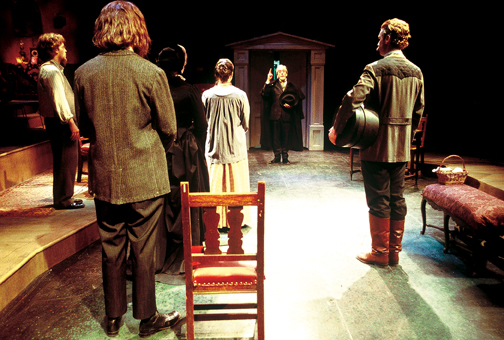Arts & Culture/Pitt Rep: Thinking Inside the Black Box

A venue that sits literally on the foundation of the Cathedral of Learning also lies, in many ways, at the heart of Pitt’s Department of Theatre Arts.
The University’s 35-year-old Studio Theatre, a “black-box” performance space, is located in the Cathedral’s basement (Room 72) near the theatre arts department’s training classrooms and its costume, scene, and properties shops. At any given time of the day or night, the Studio Theatre may be hosting classes, rehearsals, set-building sessions, photo shoots, or even 24-hour play-writing binges leading to a production by Pitt students’ new Redeye Theater Project.
This term, the Studio also will be hosting two mainstage productions by the University of Pittsburgh Repertory Theatre: Nocturnal Wanderer (Oct. 4-15), by Chinese Nobel Laureate Gao Xingjian, and A Toothache & A Plague & A Dog (Nov. 8-19), three one-act comedies by Argentine playwright Osvaldo Dragun.
Most Pitt Rep shows are staged in the Stephen Foster Memorial’s Charity Randall Theatre, a 453-seat space with a traditional proscenium stage, or in the Henry Heymann Theatre, which likewise has fixed seats (151 of them) and a traditional configuration (a thrust stage) and is located on the Foster Memorial’s lower level.
While Pitt Rep is using the Studio this fall, the directors, casts, and crews of Pitt student/laboratory productions will get to work in the Heymann Theatre, giving them experience in a more traditional venue.
The decision to trade performance spaces was made by the directors of Nocturnal Wanderer and A Toothache & A Plague & A Dog—Paul “Spike” Wilson and Melanie Dreyer, respectively—who preferred to stage those shows in the Studio because of its intimacy, high ceiling, and flexible seating.
Like other black-box theaters, the Studio is a square, unadorned room with black walls, a flat floor, and chairs that can be moved or removed to accommodate a particular production. Audience members often sit within arm’s length of the actors. University theater programs favor the black-box format because it’s versatile and fairly inexpensive to maintain. Artists like black boxes because such spaces—with their modest sets and simple lighting and sound equipment—tend to focus an audience’s attention on theater’s “pure” elements: story, language and performance.
“I like the Studio because of its versatility in terms of the seating,” says Wilson, a Pitt Ph.D. candidate in theater and performance studies. “We have a lot of options for creating interesting angles to really bring the audience into the play.”
“Like any black-box theater, the Studio is both intimate and malleable,” adds Dreyer, a Pitt assistant professor of theatre arts. “Unlike a traditional theater, where the stage and auditorium are fixed, in a black box a director can control the placement of the playing area and rearrange the actor-audience relationship to fit the ideas in the play.”
Wilson plans to create a dream-like atmosphere for Nocturnal Wanderer, while Dreyer will seek to draw audiences into the world of Toothache through innovative seating and puppetry.
In Nocturnal Wanderer, seen and unseen forces feed the mystery surrounding the murder of a prostitute on the streets of urban China. Playwright Xingjian, a Chinese émigré living in France, explores questions of violence, blame, and human isolation in this drama for mature audiences.
The setting might be any city in China today, says Wilson, but “the feeling of the set and lighting will be fragmented, shattered—like a broken mirror that has been pieced back together, out of order.”
While Wanderer audiences will be seated in a cozy, three-sided, thrust configuration, a large manhole cover will serve as a turntable on which characters—including a prostitute who is the murder victim in the play—will physically rotate as a metaphor for their psychological journeys. Angled and leaning facades and walls of city buildings will loom overhead.
A Toothache & A Plague & A Dog explores the following questions: What happens when a hardworking street vendor with no health insurance develops a gum abscess? How does a man decide between his own survival and that of South Africa? What choice does a desperate unemployed guy have when he’s offered a job as a guard dog?
To Toothache director Dreyer, the areas surrounding the Studio Theatre’s central playing space suggested imaginative technical experiments and solutions.
“The offstage areas surrounding the playing space can be used by the artistic team to create sound and lighting effects, as well as staging surprise entrances or unusual places for the audience to sit,” she says. “For Toothache, we will transform the entire theater into an underground environment, making the audience a part of the world of the play. And our design will bleed out into the lobby and the hallways.”
Toothache audience members will be offered some unusual seating options—a couch, an armchair, even milk crates and mattresses—along with traditional theater chairs.
Just the sort of thing you’d expect in the Studio Theatre.
The Pitt Rep’s 2006-07 “Global Crossings” season will continue with productions of Vinegar Tom by Britain’s Caryl Churchill, Jan. 31-Feb. 11 in the Henry Heymann Theatre, and a production of three farces by Russia’s Anton Chekhov—The Proposal, The Wedding, and The Bear—March 21-April 1 in the Charity Randall Theatre.
The “Global Crossings” season, produced by the theatre arts department in partnership with Pitt’s University Center for International Studies, will feature the traditional blend of professionals and students that characterizes Pitt Rep.
For more information, season brochures, and to order tickets online, call 412-624-PLAY (7529) or visit www.play.pitt.edu.
Other Stories From This Issue
On the Freedom Road

Follow a group of Pitt students on the Returning to the Roots of Civil Rights bus tour, a nine-day, 2,300-mile journey crisscrossing five states.
Day 1: The Awakening
Day 2: Deep Impressions
Day 3: Music, Montgomery, and More
Day 4: Looking Back, Looking Forward
Day 5: Learning to Remember
Day 6: The Mountaintop
Day 7: Slavery and Beyond
Day 8: Lessons to Bring Home
Day 9: Final Lessons

